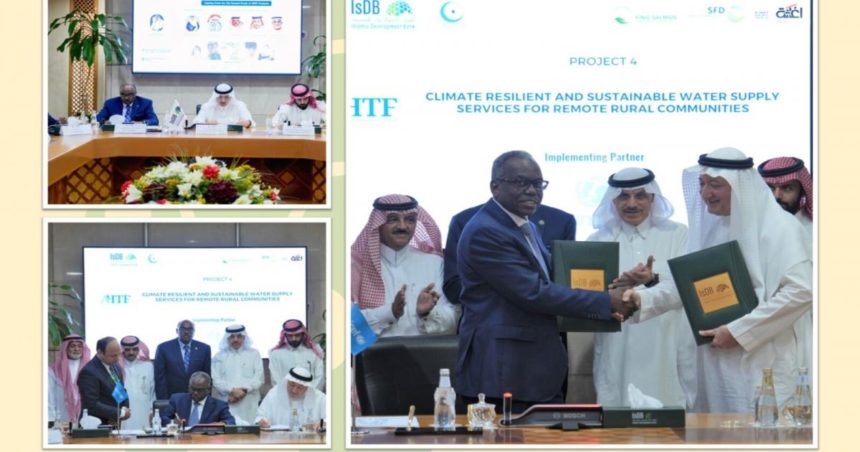RASC News Agency: The Islamic Development Bank (ISDB), serving as the custodian of the Afghanistan Humanitarian Trust Fund (AHTF), has forged dual agreements with UNICEF to embark on two projects with the objective of enhancing access to pristine and sustainable water in secluded rural Afghanistan communities while concurrently establishing a robust infrastructure for imperative health services.
The inaugural accord, denominated “Sustainable Water Supply and Climate-Resilient Water Services for Remote Rural Communities in Afghanistan,” garners collaborative backing from the Saudi Fund for Development and the Kuwait Relief Society, each contributing one million dollars. UNICEF is allocating an additional two million dollars for this year-long venture, striving to guarantee access to sustainable water services for 64,000 individuals scattered across 32 remote villages. Afghanistan ranks within the apex of the world’s ten most susceptible nations concerning climate and meteorological conditions. Prolonged droughts, unprecedented in scale, have eroded essential water reservoirs for over two decades, compelling the evacuation of myriad families from their homesteads.
The subsequent project, buttressed by one million dollars from the Saudi Development Fund and an equivalent sum from the Kuwait Relief Society, augments its financial sustenance by an extra two million dollars from UNICEF. Concentrating on delivering indispensable health services to susceptible women and children in far-flung Afghanistan communities, this venture unfolds over a span of 24 months, fortified by analogous fiscal provisions. Within the contours of this undertaking, UNICEF endeavors to erect eight health centers in remote expanses and supervise the operation and upkeep of these nascent health facilities, bestowing their benefits upon an estimated 141,000 recipients, inclusive of over 81,000 women and girls, along with nearly 30,000 children under the age of five.
Engineer Mohammad Jamal Al-Saati, coordinator of the Afghanistan Humanitarian Trust Fund and Special Advisor to the President of the Islamic Development Bank, articulated, “This collaboration epitomizes our mutual dedication to a shared objective – mitigating the afflictions of our brethren and sisters in Afghanistan. Our united endeavors, in concert with the OIC, the Saudi Development Fund, the Kuwait Relief Society, and UNICEF, are poised to exert a substantial influence on the lives of the beneficiaries of these projects, affording them access to untainted and enhanced sanitary water.”
UNICEF’s envoy in the Gulf region, Mr. Eltayeb Adam, accentuated the transformative influence of these contributions, expressing, “Access to clean water and healthcare is an inherent human right. These initiatives not only contribute to the realization of these rights but also fortify access to pristine and salubrious water for hundreds of thousands of the most vulnerable Afghanistanis.”
These accords, benefiting a cumulative populace exceeding two hundred thousand individuals, signify a pivotal milestone in the partnership between the Islamic Development Bank as the financier of the Afghanistan Humanitarian Trust Fund and UNICEF, emblematic of a resolute commitment to humanitarianism and sustainable developmental aid in Afghanistan.






